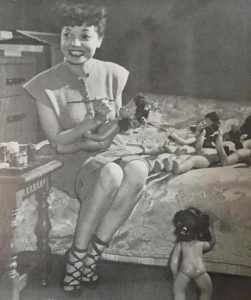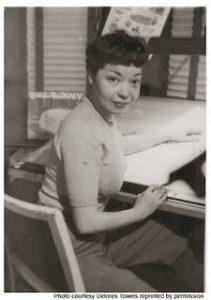Throughout history, societies have segregated their people into clans and classes by the most arbitrary criteria. Modern ideas of egalitarianism and pluralism have run a hard road to outdistance the inertia of ancient ideas and biological instincts. Such weary travelers as find themselves at a new milestone along that interminable road are made of sterner stuff than most of those they pass along the way.
One such brave traveler was Jackie Ormes, a syndicated cartoonist of the mid-20th century, who used her talent and vision to smuggle some of those new ideas past the checkpoints on that road, ideas that quietly grew and changed the way people saw the world.
Though the United States is a country that was founded on those modern concepts of equality, and has fought wars both foreign and domestic to defend them, at home the old traditions are still buried deep in the cultures that have settled here. In the days following World War II, a global conflict that repudiated racial ideology, options were still limited for Blacks. And though countless women had proven themselves in the war effort, in the air and in the factories and in all places between, their options were limited as well.
 But Jack Ormes was a Black woman who aspired to make a career for herself in journalism and cartooning, two fields divided along lines of skin color and sex. She crossed those lines and erased them by becoming the first Black woman in America to produce a nationally syndicated comic strip. The strip starred a popular character named Torchy, who was a well-educated and independent Black woman, very different from most contemporaneous depictions of Blacks. According to the 1953 documentary One Tenth Of A Nation, Ormes’ comics were seen in scores of newspapers and she had an audience of over a million readers. The effect of her work on a country on the verge of a Civil Rights revolution cannot be underestimated.
But Jack Ormes was a Black woman who aspired to make a career for herself in journalism and cartooning, two fields divided along lines of skin color and sex. She crossed those lines and erased them by becoming the first Black woman in America to produce a nationally syndicated comic strip. The strip starred a popular character named Torchy, who was a well-educated and independent Black woman, very different from most contemporaneous depictions of Blacks. According to the 1953 documentary One Tenth Of A Nation, Ormes’ comics were seen in scores of newspapers and she had an audience of over a million readers. The effect of her work on a country on the verge of a Civil Rights revolution cannot be underestimated.
But Torchy was not the only contribution that Jackie Ormes made in the struggle for America to live up to her lofty principles. Another of her characters, Patty-Jo, a little girl as independent and savvy as Torchy, was marketed as a doll for children. Not only was Patty-Jo unusual for not being presented as a negative stereotype, but she was also the first Black doll to come with a selection of fashionable attire typically reserved for White girls. Young Black girls were, perhaps for the first time, seen differently, both by themselves and others.
Jackie Ormes understood that the only way to promote positive change is with a positive message, and with the best of her prodigious ability she used her cartoons and her characters and her stories to communicate that message to the people of her country. As the first nationally syndicated Black female cartoonist, she was in a unique position to do so. Torchy and Patty-Jo created a new impression and provided inspiration.
Modern ideas of egalitarianism and pluralism still run a hard road today. But the journey is made a bit easier when someone has paved the way.
– – – – – – – – – – –
Rick Hutchins was born in Boston, MA, and has been an avid admirer of heroism since the groovy 60s. In his quest to live up to the heroic ideal of helping people, he has worked in the health care field for the past twenty-five years, in various capacities. He is also the author of Large In Time, a collection of poetry, The RH Factor, a collection of short stories, and is the creator of Trunkards. Links to galleries of his art, photography and animation can be found on http://www.RJDiogenes.com.
Hutchins is a regular contributor to this blog. Two of his published essays, on astronaut and scientist Mae Jemison and the Fantastic Four’s Reed Richards, can be found in our book Heroic Leadership.
 By
By